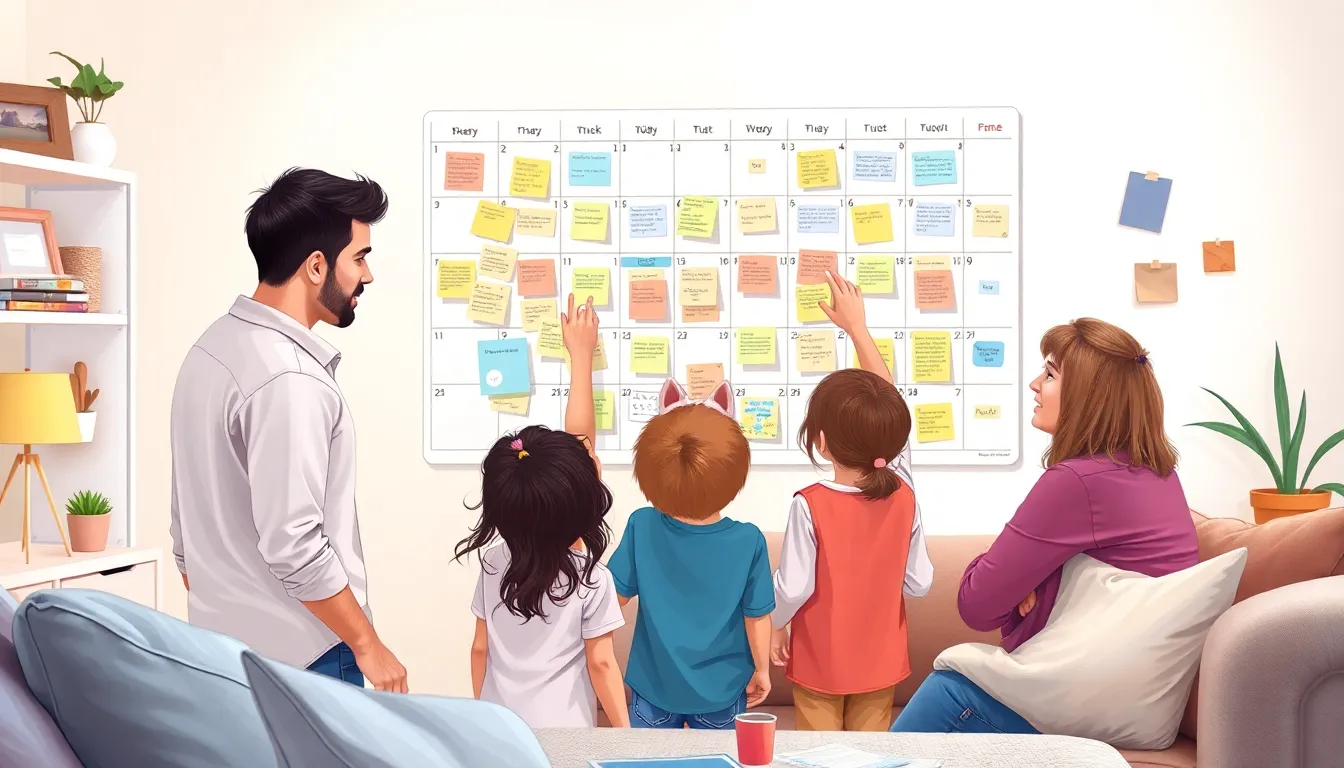In the chaotic world of parenting, establishing a family routine can feel like trying to herd cats—blindfolded. Yet, a well-crafted routine isn’t just a luxury; it’s the secret sauce that can transform daily chaos into a harmonious symphony. Picture this: mornings that don’t resemble a scene from a disaster movie and evenings filled with laughter instead of last-minute scrambling.
Table of Contents
ToggleImportance Of A Family Routine
Establishing a family routine plays a crucial role in enhancing daily dynamics. It creates structure, reduces stress, and fosters a positive environment for both children and parents.
Benefits For Children
Children benefit significantly from a well-structured family routine. Routines establish a sense of security, allowing children to anticipate daily events. Predictable activities, like mealtimes and bedtime rituals, promote stability, which enhances emotional and behavioral development. Time management skills improve as children learn the value of scheduling. Additionally, routines foster independence, providing opportunities for children to complete tasks, such as homework or chores, on their own.
Benefits For Parents
Parents experience numerous advantages from maintaining a family routine. Routines simplify planning, making daily tasks more manageable. Clear expectations reduce conflicts around schedules, enhancing cooperation among family members. Time for relaxation and self-care becomes possible, as structured days create more free moments. Routines also improve communication, allowing parents to engage in meaningful conversations during shared times, like dinner or family activities.
Creating A Family Routine

Creating a family routine fosters organization and promotes harmony within the household. It streamlines daily activities, ensuring everyone understands their roles and responsibilities.
Assessing Family Needs
Assessing family needs involves evaluating individual schedules, preferences, and dynamics. Determine daily obligations for each family member, including work hours and school commitments. Identify challenges faced, such as time constraints or sibling conflicts. Consider family members’ emotional needs, including quality time together and personal space. Addressing these factors ensures the routine meets diverse needs, creating a balanced structure that enhances family life.
Setting Clear Goals
Setting clear goals establishes the family’s priorities and outlines desired outcomes. Identify specific areas to improve, like reducing morning chaos or increasing family bonding time. Set measurable targets, such as dedicating three evenings a week for family dinners or establishing a nightly wind-down routine. Keep goals realistic and flexible to encourage participation from all family members. Regularly review these goals to adapt and adjust them as needed, ensuring they support a harmonious family environment.
Implementing And Maintaining The Routine
Implementing and maintaining a family routine requires commitment and adaptability. A well-executed routine can transform daily life into a structured, enjoyable experience for all family members.
Consistency Is Key
Consistency reinforces the family routine and builds trust among members. Sticking to the established schedule helps children understand expectations, which enhances their sense of security and independence. Set specific times for morning activities, meals, and bedtime. For instance, designating 7:00 AM for waking up and 8:30 PM for lights out fosters predictability. Regularly following the routine minimizes confusion and keeps everyone aligned.
Involving Everyone In The Process
Involving all family members in creating the routine fosters ownership and commitment. Discuss each person’s preferences and constraints to ensure the routine accommodates everyone’s needs. Use tools like family meetings or shared calendars to facilitate open communication. Assign age-appropriate tasks, like chores or preparation for meals, to promote responsibility among children. Engaging everyone cultivates a sense of teamwork and accountability, enhancing adherence to the family routine.
Adapting The Routine Over Time
Adapting a family routine ensures its effectiveness as family dynamics and individual needs evolve. Families benefit from recognizing the importance of flexibility and introducing new activities that respond to changing interests and commitments.
Flexibility For Changing Schedules
Flexibility accommodates varying schedules and unexpected events. Families should prioritize open communication, discussing significant changes in routines, such as school holidays or extracurricular commitments. By allowing adjustments, families can maintain harmony and reduce stress. Employing tools like shared calendars can enhance coordination, ensuring all members stay informed about schedule changes. Families achieve better balance when they proactively adapt to new circumstances.
Incorporating New Activities
Incorporating new activities enriches family routines and strengthens bonds. Families can introduce experiences like game nights, outdoor excursions, or collaborative cooking sessions. By integrating diverse activities, families foster engagement and variety, contributing to overall well-being. Setting aside specific times each week for these activities ensures they become part of the routine. Families thrive through exploration and creativity, reinforcing positive attitudes toward shared time together.
Establishing a family routine is essential for creating a harmonious household. It not only streamlines daily tasks but also nurtures emotional well-being among family members. By fostering a sense of security and promoting teamwork, routines can transform family life into a more enjoyable experience.
Flexibility and open communication play key roles in maintaining an effective routine. As family dynamics evolve, adapting the routine ensures it continues to meet everyone’s needs. Incorporating fun activities can further strengthen family bonds, making shared time more meaningful.
Ultimately, a well-structured family routine enhances both individual growth and collective happiness, paving the way for a supportive and loving environment.






